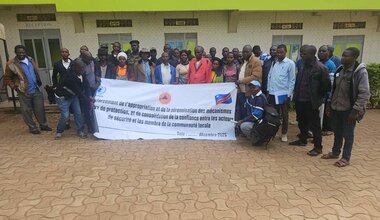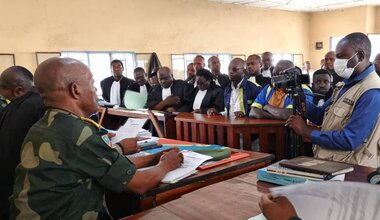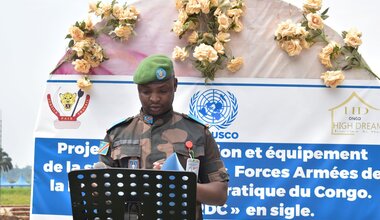Equateur: IEC and MONUSCO sensitize women leaders on the electoral process
Mbandaka, 20 November 2010 - Women in the Equateur province have been urged to be actively involved in the forthcoming electoral process that kicks off in Mbandaka on 30 November. The process will start with a review of the electoral register. At a meeting with some 60 female leaders from various local women's association on Wednesday November 17, representatives of the Independent Electoral Commission (IEC) told the women they should be more involved than they were in 2006 when the last elections were held. The meeting was held in partnership with MONUSCO.
Discussions at the meeting focused on strategies that will enable the women participate better than in the 2006 electoral process. The meeting was a response to an invitation by the IEC and MONUSCO to the main actors in the electoral process in Equateur. These actors include political parties, civil society organizations, religious groups and youth movements and associations.
The women spoke of their underrepresentation in decision-making bodies. Through the president of the local Coalition of Women's Associations (COLFEQ), Ms Odile Bofwa the women noted with regret that they were rarely in top positions in elective offices. Regrettably, she said, there were only four women in the Provincial Assembly's 108 members and two ministers from their body in the ten provincial ministries. Ms Bofwa noted how this state of affairs was inconsistent with the UN Security Council Resolution 1325 which requires Member States to implement policies that promote gender equality. It is against this background that she called on "women not to be afraid of elections this time around, but to participate in large numbers and have their names registered in the electoral lists, starting from 30 November."
The head of MONUSCO's Mbandaka office, Mr. Ould Mohamed Abdellahi, encouraged the participants at the meeting to mobilize their womenfolk by adopting a door-to-door approach if necessary. Mr. Abdellahi noted that despite their demographic weight, and the vital role they play in the development of society, women still remain marginalized. In order to reverse this trend, he said, women must mobilize and sensitize their support bases, register in huge numbers on the electoral rolls and participate actively in the electoral process. Women should not rely on others but on themselves to change this state of affairs.
He called on them to wage this battle in a non-violence manner based on the full respect of the law. They should also avoid tribalism, he told them. Mr. Abdellahi also reminded the women that the role of the United Nations was not to organize elections in the DRC, but to assist the country's authorities and the IEC in organizing those elections.
While explaining the steps of the process including the timeline and documents required, the IEC representatives emphasized the importance of the operation that will eventually lead to a smooth running elections. The IEC is expected to hold similar meetings in churches, schools and other places.
 UN
UN United Nations Peacekeeping
United Nations Peacekeeping






